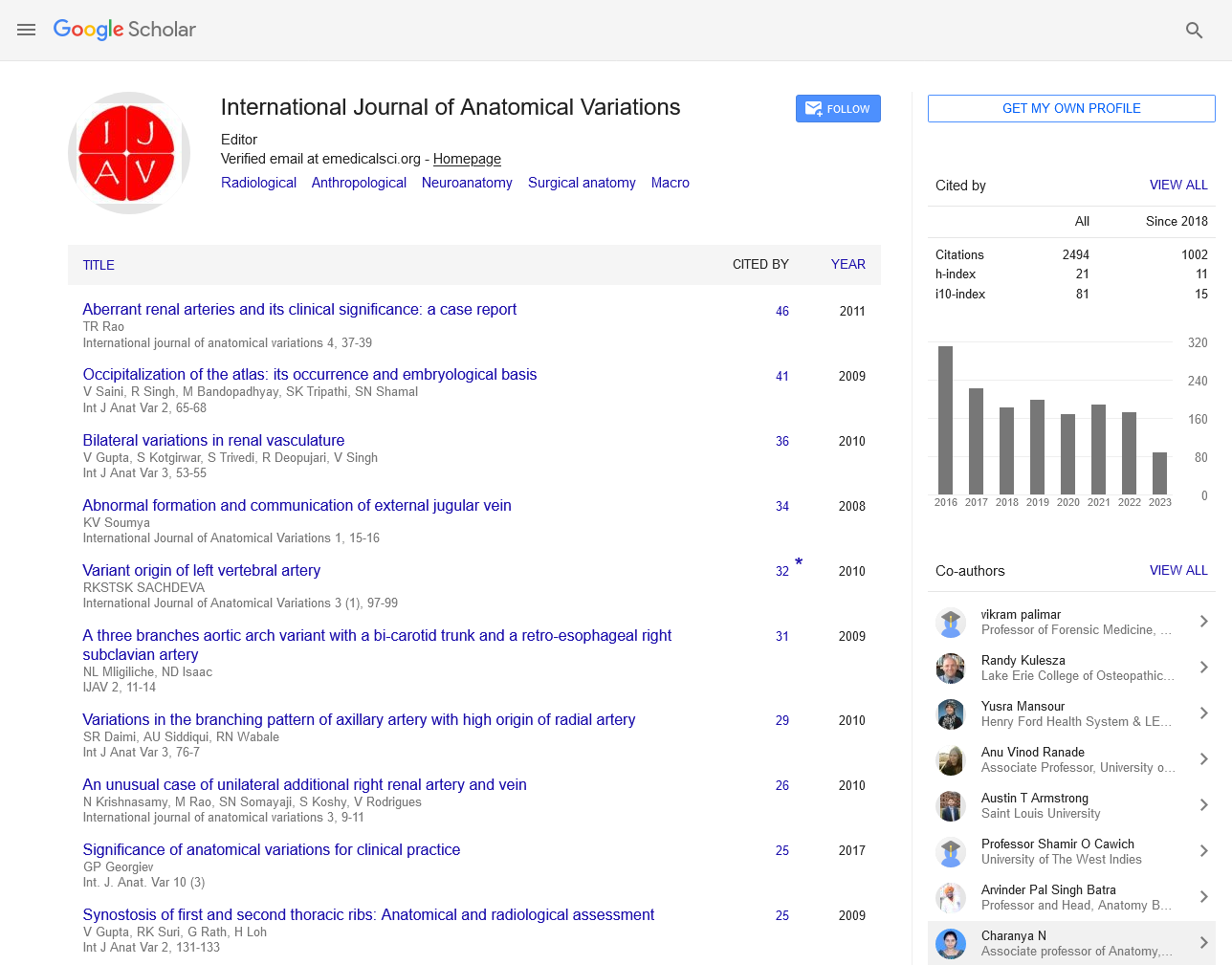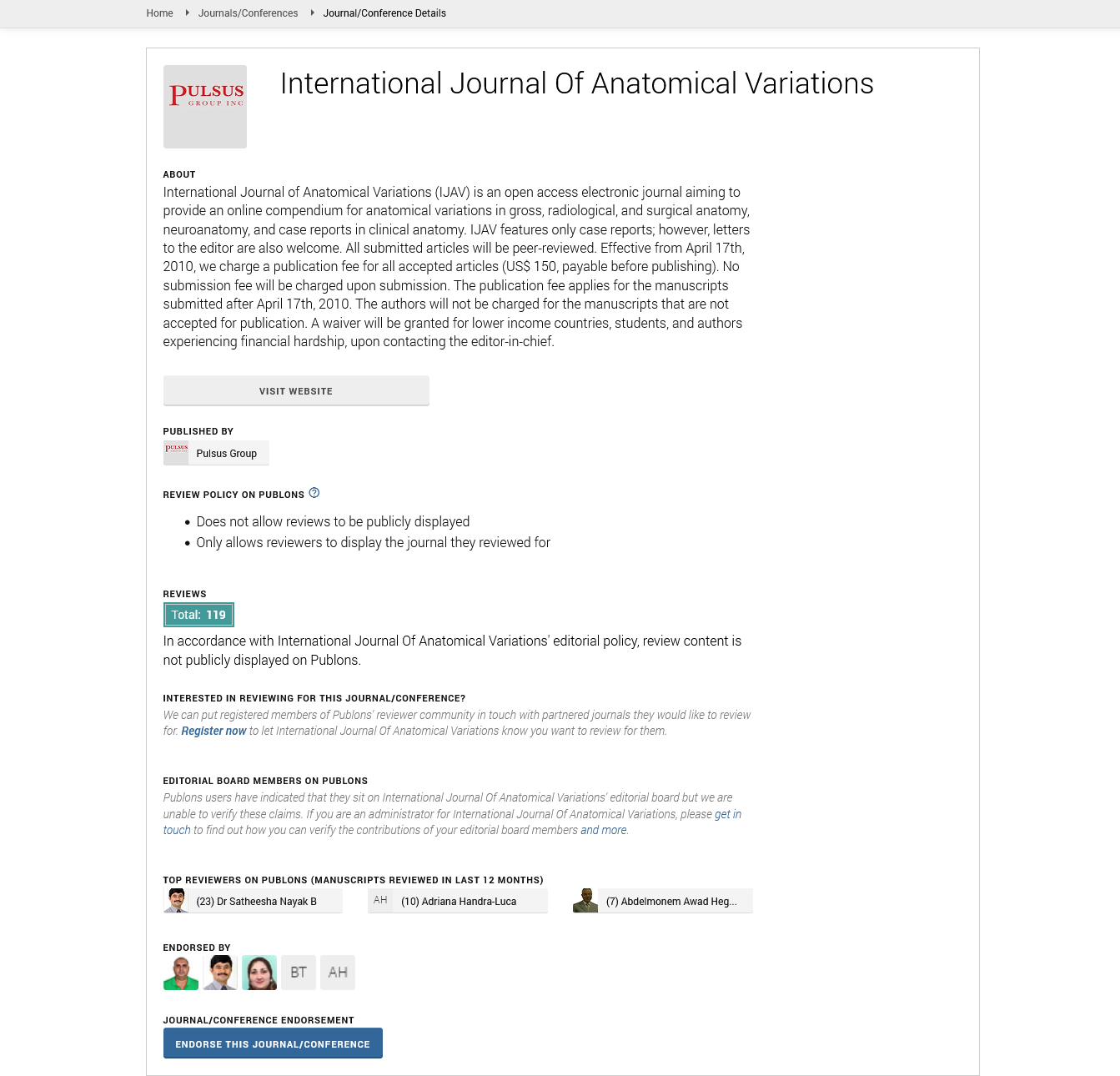Gut Microbiota Studies: An Insight into the Impact of Microbes on Human Health
Received: 28-Feb-2023, Manuscript No. ijav-23-6235; Editor assigned: 01-Mar-2023, Pre QC No. ijav-23-6235 (PQ); Accepted Date: Mar 21, 2023; Reviewed: 14-Mar-2023 QC No. ijav-23-6235; Revised: 21-Mar-2023, Manuscript No. ijav-23-6235 (R); Published: 28-Mar-2023, DOI: 10.37532/1308-4038.16(3).245
Citation: Hvizdosova N. Gut Microbiota Studies: An Insight into the Impact of Microbes on Human Health. Int J Anat Var. 2023;16(3):263-264.
This open-access article is distributed under the terms of the Creative Commons Attribution Non-Commercial License (CC BY-NC) (http://creativecommons.org/licenses/by-nc/4.0/), which permits reuse, distribution and reproduction of the article, provided that the original work is properly cited and the reuse is restricted to noncommercial purposes. For commercial reuse, contact reprints@pulsus.com
Abstract
The gut microbiota is a complex ecosystem composed of trillions of microorganisms that play an essential role in human health. In recent years, numerous studies have been conducted to explore the impact of gut microbes on human health, and the findings have been promising. This case report provides an overview of recent research on gut microbiota and its implications for human health, including the role of gut microbes in digestion, immune function, and disease.
Keywords
Gut microbiota, Dysbiosis, Digestion, Immune function, Disease
INTRODUCTION
The gut microbiota is a complex and diverse ecosystem of microorganisms that resides in the human gastrointestinal tract. These microorganisms, primarily bacteria, but also including viruses, fungi, and protozoa, play a crucial role in human health by performing vital functions such as digestion, immune regulation, and protection against pathogens. The gut microbiota also plays a role in various diseases, including inflammatory bowel disease, obesity, and cancer. Thus, understanding the composition and function of gut microbes is crucial for maintaining optimal health [1]. The gut microbiota, also known as gut flora, refers to the community of microorganisms that reside in the digestive tract of humans and other animals. This complex ecosystem is composed of trillions of microorganisms, including bacteria, fungi, viruses, and archaea.
The gut microbiota plays a crucial role in various physiological processes, including digestion, immune function, metabolism, and even brain function. The bacteria in the gut can break down complex carbohydrates and produce essential nutrients such as vitamins B and K [2]. The gut microbiota also helps to maintain a healthy immune system by preventing the colonization of harmful bacteria and promoting the growth of beneficial ones.
Research has also suggested that the gut microbiota can influence mental health, with studies linking imbalances in the gut microbiota to conditions such as depression and anxiety [3-5]. Understanding the role of the gut microbiota in health and disease is an active area of research, and scientists are exploring new ways to modulate the gut microbiota to improve health outcomes.
METHODS
This case report provides a review of recent research on gut microbiota, including studies on the composition of the gut microbiota, the role of gut microbes in digestion, immune function, and disease. The literature was reviewed using various databases such as PubMed and Google Scholar. The study of the gut microbiota, which refers to the community of microorganisms living in the human gastrointestinal tract, is an area of growing interest in the field of health and medicine. The gut microbiota is known to play a critical role in human health, with research suggesting that imbalances in gut microbial communities can lead to a range of health problems, including metabolic disorders, autoimmune diseases, and even mental health issues [6].
RESULTS
Recent studies have shown that the composition of the gut microbiota varies widely between individuals and is influenced by several factors, including diet, age, genetics, and lifestyle. Gut microbes are involved in various aspects of digestion, including the breakdown of complex carbohydrates, the synthesis of vitamins, and the metabolism of bile acids [7-9]. The gut microbiota also plays a critical role in regulating the immune system, as well as protecting against pathogens. Dysbiosis, an imbalance in the gut microbiota, has been linked to several diseases, including inflammatory bowel disease, obesity, and cancer [10-11].
CONCLUSION
The gut microbiota is a complex and dynamic ecosystem that plays an essential role in human health. Recent studies have highlighted the impact of gut microbes on various aspects of human physiology and the implications for disease [12]. The findings of these studies suggest that targeting the gut microbiota may hold promise for the prevention and treatment of various diseases [13-14]. However, further research is needed to fully understand the complex interactions between gut microbes and human health.
ACKNOWLEDGEMENT:
None
CONFLICTS OF INTEREST:
None.
References
- Xin W, Bofu L. Aortic Dissection with Rare Anatomical Aortic Arch Variation Depicted by Computed Tomography Angiography. Heart Surg Forum. 2021; 24(2): E407-E408.
- Foivos I, Jonathon K, Daryll B. Aberrant right subclavian artery - a rare congenital anatomical variation causing dysphagia lusoria. Vasa. 2021; 504(5):394-397.
- Schizas N, Patris V, Lama N. Arc of Buhler: A lifesaving anatomic variation. A case report. J Vasc Bras. 2012; 37(11):9-326.
- Penprapa SK, Brianna KR. Duplication of the inferior vena cava: evidence of a novel type IV. Folia Med Cracov. 2020; 28; 60(2):5-13.
- Laurent de K, Stefano M. Variability of repairable bicuspid aortic valve phenotypes: towards an anatomical and repair-oriented classification. Eur J Cardiothorac Surg. 2019; 37(11):9-828.
- Jun S, Zhang-Y, Chuan C. Postoperative neovascularization, cerebral hemodynamics, and clinical prognosis between combined and indirect bypass revascularization procedures in hemorrhagic moyamoya disease. Clin Neurol Neurosurg. 2021 Sep; 208:106869.
- Qi L, Xiaojie T, Yafang D. Evaluation of Carotid Plaque Rupture and Neovascularization by Contrast-Enhanced Ultrasound Imaging: an Exploratory Study Based on Histopathology. Transl Stroke Res. 2021 Feb; 12(1):49-56.
- Kuo-Shyang J, Shu-Sheng L, Chiung-FC. The Role of Endoglin in Hepatocellular Carcinoma. Int J Mol Sci. 2021 Mar 22;22(6):3208
- Anri S, Masayoshi O, Shigeru H. Glomerular Neovascularization in Nondiabetic Renal Allograft Is Associated with Calcineurin Inhibitor Toxicity. Nephron. 2020;144 Suppl 1:37-42
- Mamikonyan VR, Pivin EA, Krakhmaleva DA. Mechanisms of corneal neovascularization and modern options for its suppression. Vestn Oftalmo. 2016;132(4):81-87
- Brian M, Jared PB, Laura E. Thoracic surgery milestones 2.0: Rationale and revision. J Thorac Cardiovasc Surg. 2020 Nov; 160(5):1399-1404.
- Amy LH, Shari LM. Obtaining Meaningful Assessment in Thoracic Surgery Education . Thorac Surg Clin. 2019 Aug;29(3):239-247.
- Farid MS, Kristin W, Gilles B. The History and Evolution of Surgical Instruments in Thoracic Surgery. Thorac Surg Clin. 2021 Nov; 31 (4): 449- 461.
- John C, Christian J. Commentary: Thoracic surgery residency: Not a spectator sport. J Thorac Cardiovasc Surg. 2020 Jun; 159(6):2345-2346.
Indexed at, Google Scholar, Crossref
Indexed at, Google Scholar, Crossref
Indexed at, Google Scholar, Crossref
Indexed at, Google Scholar, Crossref
Indexed at, Google Scholar, Crossref
Indexed at, Google Scholar, Crossref
Indexed at, Google Scholar, Crossref
Indexed at, Google Scholar, Crossref
Indexed at, Google Scholar, Crossref
Indexed at, Google Scholar, Crossref
Indexed at, Google Scholar, Crossref
Indexed at, Google Scholar, Crossref
Indexed at, Google Scholar, Crossref






